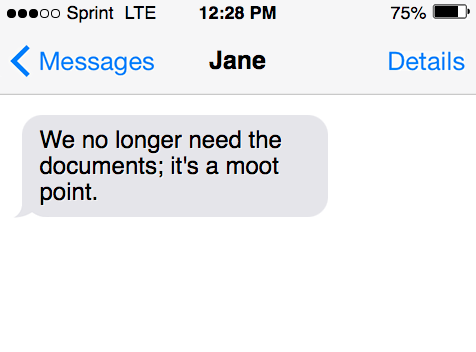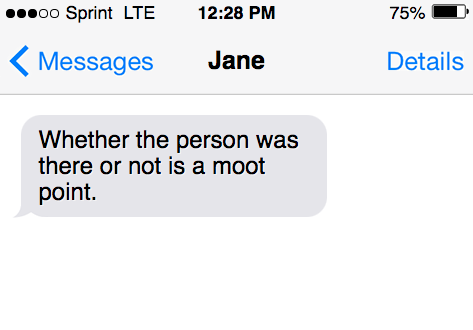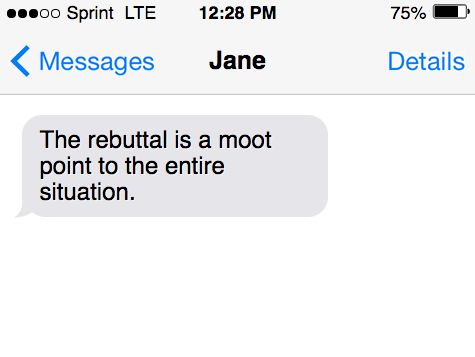What is a moot point? Why is it used in common American English? What is a mute point? Are they the same? These two idioms can be confusing to comprehend. One of them is used in legal discussions. While another is used in informal discussion.
Learn the difference between moot point and mute point in this idiom guide…
What is a “moot point?”
In English grammar, a moot point is an argument or issue that is no longer relevant or worth discussing. The term can be used in both formal and informal contexts. Moot is derived from the Old French word mot, meaning “word” or “speech.”
The word moot originally meant “debatable” or “open to debate.” Over time, it came to be used more specifically to refer to something that was worth debating but no longer relevant.
In modern usage, moot is often used informally to describe something that isn’t worth discussing because it’s no longer relevant.

For example, you might say, “That argument is moot now that we’ve agreed on a different course of action.” In some cases, moot can also be used to describe something that was never relevant in the first place.
For example, you might say, “The question of who will take out the trash is moot since we don’t have any trash.”
Etymology of “moot point”
The term ‘moot point’ is derived from the Old French word ‘mot,’ meaning ‘word’ or ‘spoken discussion.’ The word ‘moot’ originally referred to a gathering of people for the purpose of discussing matters of public interest.
Over time, the meaning of the word shifted to refer to a matter that is open to debate or discussion. In modern English, a moot point is an issue that is debatable or open to interpretation.
The phrase is often used in legal contexts to refer to an issue that is no longer relevant, or that has been resolved. However, it can also be used more generally to refer to any situation in which there is room for debate.

Synonyms for “moot point”
In English grammar, a moot point is an issue that is no longer relevant or worth discussing.
While there are many ways to say “moot point” in different contexts, here are some of the most common synonyms:
- Red herring: This term is often used in legal contexts to describe an issue that distracts from the real question at hand. For example, “The defendant’s criminal record is a red herring; the question at hand is whether or not he committed the crime.”
- Non-issue: This term is used to describe an issue that is not worth discussing because it has no bearing on the matter at hand. For example, “The color of the walls is a non-issue; what matters is whether or not the house is structurally sound.”
- Distraction: This term can be used to describe an issue that takes attention away from more important matters. For example, “The ongoing debate about the national anthem is just a distraction from more pressing issues.”
Thus, while there are many ways to say “moot point,” these three terms are some of the most commonly used synonyms. So next time you’re looking to avoid repeating yourself, remember that there are other options beyond “moot point”!
What is a “mute point?”
A “mute point” is an error that occurs when a speaker incorrectly uses the homophone “moot” in place of the similar-sounding word “mute.”
This mistake is most often made in written form, as the incorrect word can be easily overlooked when it is read aloud.
While the two words have different meanings, they are often used in similar contexts, which can contribute to confusion. “Moot” typically refers to something debatable or open to opinion, while “mute” means silent or without sound.
Therefore, using “mute point” instead of “moot point” entirely changes the phrase’s meaning. Although this error is relatively innocuous, it can be frustrating for readers or listeners familiar with the proper usage of these words.
To avoid this mistake, it is crucial to be careful when choosing between “moot” and “mute.” If you are unsure which word is appropriate for your sentence, consult a dictionary or grammar guide. With a little extra attention to detail, you can avoid making this common error.

Difference between mute point and moot point
There is often confusion over the terms “mute point” and “moot point.” Both terms are derived from the Latin word “moot,” which means “to discuss.”
A moot point is therefore a point that is open to discussion or debate. A mute point, on the other hand, is a point that is not worth discussing because it is trivial or irrelevant.
In other words, a moot point is debatable while a mute point is not. The term “moot point” is more commonly used in British English, while the term “mute point” is more common in American English. However, both terms are considered to be interchangeable.
Which is correct, “mute point” or “moot point?”
The term “moot point” is often used instead of “mute point,” but the two phrases have different meanings. A moot point is an issue that has no bearing on the matter at hand. In contrast, a mute point is an issue that has already been decided and is no longer open for discussion.
In other words, a moot point is something that isn’t relevant, while a mute point is something that is no longer relevant.
The origin of the phrase “moot point” is unclear, but it may come from the law. In medieval times, a “moot” was a gathering of local people who would discuss matters of importance to the community.
If an issue were deemed unimportant or irrelevant, it would be said to be “moot.” Over time, this usage evolved into the current meaning of the word.
As for “mute point,” this phrase appears to be a more recent coinage. It’s possible that it was created as a play on words, with the word “point” being used in both its literal and figurative senses.
Alternatively, it may simply be a corruption of the phrase “moot point.” Whatever the case, both terms are now well-established in the English language.
Sentence examples using “moot point”
A moot point is an arguable issue that is still unresolved or otherwise open to debate. It can also refer to a matter that is no longer relevant or important. The term comes from Old English “mōt,” meaning “meeting” or “assembly.”
In legal contexts, a moot point is an issue that has yet to be decided by a court of law and is open to debate.
For example, if a contract states that payment must be made within 30 days. But the 30th day falls on a weekend, so whether payment is due on that day or the next business day would be considered a moot point. In other situations, an issue may be considered moot if it has been rendered irrelevant by subsequent events.
However, it is worth noting that some people consider it incorrect to use the term this way, as the word “moot” can also mean “irrelevant.”
As a result, it is always best to err on the side of caution when using this term. And to make sure that your audience will understand what you mean.
- We no longer need the documents; it’s a moot point.
- Whether the person was there or not is a moot point.
- The rebuttal is a moot point to the entire situation.
Inside this article
Fact checked:
Content is rigorously reviewed by a team of qualified and experienced fact checkers. Fact checkers review articles for factual accuracy, relevance, and timeliness. Learn more.
Core lessons
Glossary
- Abstract Noun
- Accusative Case
- Anecdote
- Antonym
- Active Sentence
- Adverb
- Adjective
- Allegory
- Alliteration
- Adjective Clause
- Adjective Phrase
- Ampersand
- Anastrophe
- Adverbial Clause
- Appositive Phrase
- Clause
- Compound Adjective
- Complex Sentence
- Compound Words
- Compound Predicate
- Common Noun
- Comparative Adjective
- Comparative and Superlative
- Compound Noun
- Compound Subject
- Compound Sentence
- Copular Verb
- Collective Noun
- Colloquialism
- Conciseness
- Consonance
- Conditional
- Concrete Noun
- Conjunction
- Conjugation
- Conditional Sentence
- Comma Splice
- Correlative Conjunction
- Coordinating Conjunction
- Coordinate Adjective
- Cumulative Adjective
- Dative Case
- Determiner
- Declarative Sentence
- Declarative Statement
- Direct Object Pronoun
- Direct Object
- Diction
- Diphthong
- Dangling Modifier
- Demonstrative Pronoun
- Demonstrative Adjective
- Direct Characterization
- Definite Article
- Doublespeak
- False Dilemma Fallacy
- Future Perfect Progressive
- Future Simple
- Future Perfect Continuous
- Future Perfect
- First Conditional
- Irregular Adjective
- Irregular Verb
- Imperative Sentence
- Indefinite Article
- Intransitive Verb
- Introductory Phrase
- Indefinite Pronoun
- Indirect Characterization
- Interrogative Sentence
- Intensive Pronoun
- Inanimate Object
- Indefinite Tense
- Infinitive Phrase
- Interjection
- Intensifier
- Infinitive
- Indicative Mood
- Participle
- Parallelism
- Prepositional Phrase
- Past Simple Tense
- Past Continuous Tense
- Past Perfect Tense
- Past Progressive Tense
- Present Simple Tense
- Present Perfect Tense
- Personal Pronoun
- Personification
- Persuasive Writing
- Parallel Structure
- Phrasal Verb
- Predicate Adjective
- Predicate Nominative
- Phonetic Language
- Plural Noun
- Punctuation
- Punctuation Marks
- Preposition
- Preposition of Place
- Parts of Speech
- Possessive Adjective
- Possessive Determiner
- Possessive Case
- Possessive Noun
- Proper Adjective
- Proper Noun
- Present Participle
- Prefix
- Predicate



